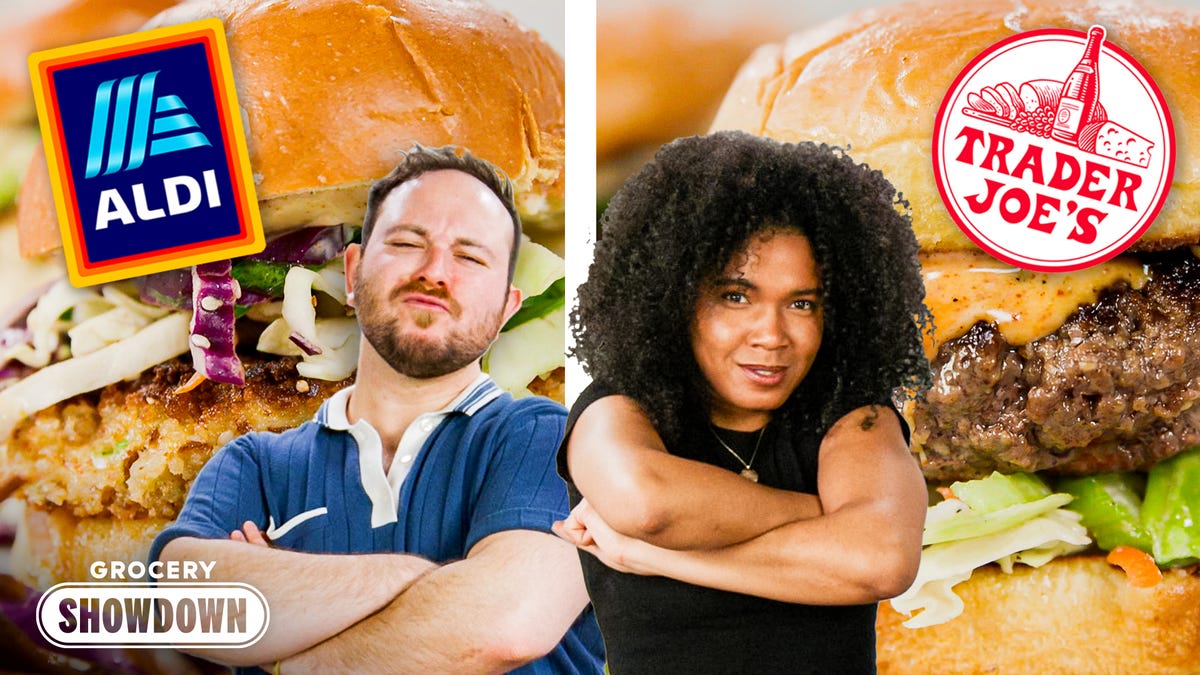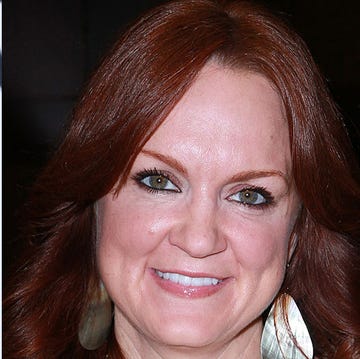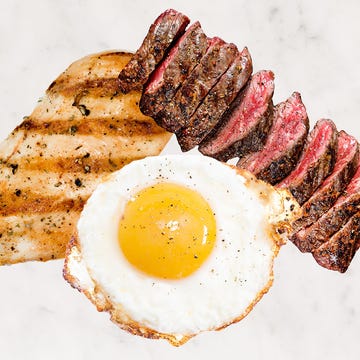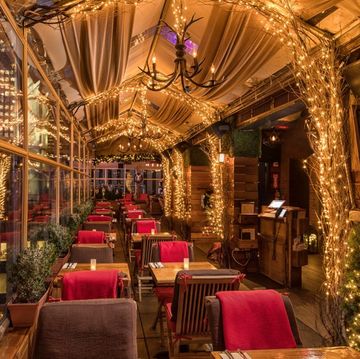There's a story José Andrés likes to tell about cooking with his father. We're sitting backstage at L.A.'s historic Wiltern Theater before the chef’s Power Of Food event, and he's thinking back to his childhood in Spain.
José was born in Mieres, a tiny 40,000 person town on the northern edge of the country, about an hour from the coast. His family later moved to a small village outside Barcelona, and dinners were always made in their kitchen, not in a restaurant's. It was an activity José and his mother often shared — except for one certain dish.
"My father made the paella," José remembers. His dad, Mariano, would cook vats of it at a time, enough to feed family, and friends, and then some. "I wanted to help, to stir the pot," José remembers, the memory still fresh. "But my father made me tend the fire."
The lesson, his father taught him, was simple: If you can control the flames, you can cook anything.
He quickly snaps out of his nostalgic haze and comes back to reality. "I don’t know if I romanticize it too much, but it’s served me well," he admits. "I always ask myself, 'What's the fire that keeps you going?' Sometimes, it's not an easy question to answer."
Then, with what might be a tiny twinkle in his eye, José deadpans, “I tell that story because, obviously, being a chef, it's a very good one, no?"
It is a good story. And, yes, he is a chef. But there's more to it.
After Hurricane Maria, the category 5 monster storm that hit Puerto Rico last September, José landed on the island before anyone else — including the U.S.'s Federal Emergency Management Agency (FEMA). When disaster strikes, he's the second day story — in Los Angeles, providing relief to those affected by the Thomas Fire, California's largest wildfire on record, or in Montecito, CA, where mudslides recently destroyed more than 100 homes.
José doesn't bemoan the flames anymore. He's runs to them.
José might be the most famous chef you don't know. He's never judged a Food Network cooking show, and there are no memes about his style (though his signature vest is begging for its own Instagram account). But he's the force behind 33 restaurants, in D.C., Los Angeles, Las Vegas, even Mexico City; and his circle of friends is a who's who of the culinary world: the late Anthony Bourdain, David Chang, Andrew Zimmern. He's Spain's golden boy, stopped for pictures on the street.
The past two years have been a period of rebirth for José, though, spent not only cooking meals, but cooking up plots to save the world, too. He's not just a chef anymore. José's also a quasi-politician, and he's one of Time's Most Influential People of 2018. He’s a humanitarian, too — the Humanitarian of the Year, according to the James Beard House.
But all that acclaim — eh, he could take it or leave it.
"It seems like there’s a little too much 'I'," José says. "We need to start using three words that are part of the DNA of America. It's not about 'I, the person.' It’s about 'we, the people.'"
And José wonders why people think he should run for office.
There's a spotlight shining on José — literally — as he takes the stage for his event, but even then, he doesn't want to be in it. He's standing in front of the hundreds of people who have come to see him speak, asking to make the focus more about the people he's helping, not the help he's giving them. "Don't just clap like seals when I walk out here," he tells them. "Do something when you leave this building."
Changing the world through the power of food has always been José's mantra — he's just doing it differently than he used to.
José moved from Spain to the U.S. in 1991, landing in New York City before heading to D.C. two years later. That's where he opened Jaleo. If you haven't heard of the restaurant, you've experienced it's effect. José's Spanish small plates spot is likely the reason you know what tapas are. That first D.C. location is still thriving — as are the four other outposts that came in the years that followed. (Another Jaleo is opening in Disney Springs soon.)
"When I started, the nights were empty in downtown D.C.," José remembers. "There was nobody on the street." Jaleo was his way in — "to reach a place nobody else had."
That's all it takes, José contends: "Just by opening a restaurant in a new neighborhood, you’re becoming an agent of change. So really, I’m not doing anything differently today than I was 25 years ago. It just seems like it's become fashionable in our industry to do and to speak about these things."
Robert Egger, José's Power of Food co-host and a member on the board of his nonprofit, World Central Kitchen (WCK), has a better way of putting it, José says: "Twenty-first century charity seems to be about the redemption of the giver instead of what it should be about: the liberation of the receiver."
But José is humble, not stupid. He knows attention can equal support. So instead of promoting a brand — like that of "The Charitable Chef" — through interviews, José let Instagram serve as his voice post-hurricane. In the two months that followed Maria, the chef posted 161 photos from Puerto Rico. Each image or video — even the ones filmed sideways, with shots up José's nose — garnered more attention, which led to more help.
As of November, José and his crew at WCK had served 3 million meals to the disaster-stricken region — a number the U.S. government didn't even come close to hitting. FEMA had a contract for 30 million meals; only 50,000 made it to Puerto Rico.
José planned to stay in Puerto Rico for five days, but you know what they say about the best laid plans. "I ended up putting my life on hold for months. My wife and children were like, 'What the heck is going on?'. But it wasn't just me who did that. By the end, we had 20,000 people helping."
Now he's writing a book, due out in September — We Fed An Island, one of the last texts from Anthony Bourdain's HarperCollins imprint that'll hit shelves — about the experience. "Days were long, and I cried a lot at nights. I remember hearing after Hurricane Katrina, this will never happen again. But it did happen again. And this time, it happened on an entire island. I hope we can come up with ideas for how to do this better next time."
BUY NOW We Fed An Island, $28, amazon.com
José talks about "we" and "next time," even though disaster relief wasn't one of WCK's founding principles. Yes, he started it in the wake of the 2010 earthquake in Haiti, but the site's mission statement is this: to create smart solutions to end hunger and poverty. WCK has bettered cafeterias in Zambia. The organization created a culinary school in Haiti. José helped fund a women-led honey company in the Dominican Republic.
"We were not supposed to be in a disaster zone again — and there we were," José sighs. "But we can't randomly decide what's worth our effort and what's not. Emergency means now, and anything is beyond now is too late."
Throughout our conversation, José's face is mostly scrunched, concentrating on his message — and the language. "Maybe now I'm able to, I don't know, explain my ideas better? Maybe they understand my English finally," he jokes about his transition from a charitable chef to the charitable chef.
But José's furrowed brow loosens when he talks about his family. He's been married to his wife Patricia for almost 23 years, and together they have three daughters: Carlota (19), Ines (17), and Lucia (14). "They are a big reason I do what I do," he admits.
Even when José isn't 'doing what he does' — hopping from one disaster-stricken area to another — he's not sitting still. He's in Virginia wine country or he's dozens of feet below the surface of the Atlantic. "I love to get lost in the water with my wife, scuba diving for hours at a time," he says.
Then there’s the twinkle in his eye again. "I’m like the little mermaid — but no so little."
Follow Delish on Instagram.
















